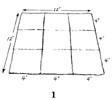Pie and Pastry Bible (137 page)
Read Pie and Pastry Bible Online
Authors: Rose Levy Beranbaum

Pipe two fillings, such as remonce and pastry cream or remonce and preserves, into the center of each triangle, side by side, using about ½ teaspoon of each, and sprinkle each with about 2 teaspoons of nuts. Proceed as for the Spandau. The baked triangles will be 5 inches by 4 inches by 1 inch high. (Figure 5) For very puffy triangles, roll double the amount of dough to a ¼inch thickness.
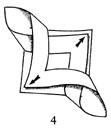
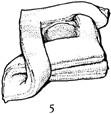
The finished pastries will be 6 inches by 4½ inches by 1° inches high. Baking times for both will be 20 to 30 minutes.
BALLOONS
Spreading the Spandau with a thin layer of remonce and baking them upside down causes them to blow up like hot air balloons, lending the dough a wonderfully soft, light texture with the denser almond filling in the center. I adore this shape. You will need only about ¾ cup of remonce and the egg wash to seal the Spandau; omit the almonds. Brush the egg wash over all four edges of each square. Spread a very thin layer of remonce (a scant 2 teaspoons) over the pastry, almost up to the egg-washed edges. Bring up the four corners to the center and pinch the seams closed. Place the Spandau seam side down on the prepared baking sheet. Proceed as above, brushing them with the transparent glaze after baking. The baked balloons will be about 4 inches square by 1½ inches high.
PRUNE OR APRICOT TRIANGLES
This is the classic Danish shape you see in delis and bakeries. The luscious fillings are very easy to make. Spread about 2 tablespoons of Prune or Apricot Lekvar (page 513 or 512) to within ½ inch from the edges of each dough square (Figure 1, page 497). Dab the overlap with a little egg yolk to secure it. (Figure 2) Bring two opposite corners to the center (Figure 3), overlapping them by about ½ inch. (Figure 4) After the triangles have risen, press the centers firmly with your finger to keep them from opening during baking. (Figure 5)
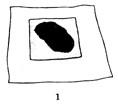

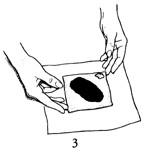
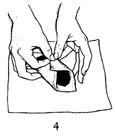
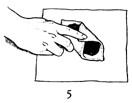
STORE
Room temperature, up to 2 days; frozen, up to 3 months. The baked Danish can be reheated in a preheated 300°F. oven for 5 minutes (8 minutes if frozen).
POINTERS FOR SUCCESS
 It is best to cover the dough with the inverted 2-inch-deep pan, so that nothing touches the surface.
It is best to cover the dough with the inverted 2-inch-deep pan, so that nothing touches the surface.
BEAR CLAWS (OR COCKSCOMBS)
I
n Denmark, this is the most popular of all Danish pastry shapes, especially with children. The upper part of the dough is filled with the traditional remonce (almond filling) and sealed so that the lower part can be slashed and spread apart to form the claws without any of the filling leaking. Should a little leak, however, the filling puddles next to the Danish and bakes into a delicious crisp disc that can be eaten like a cookie along with the bear claw—a special treat. The tops of these Danish glisten with coarse granulated sugar and are further adorned by a sprinkling of golden sliced almonds.
| TEMPERATURE: 400°F., THEN 375°F. • BAKING TIME: 18 TO 20 MINUTES MAKES: NINE 5- BY 3- BY 1¼-INCH-HIGH PASTRIES | |||
|---|---|---|---|
| INGREDIENTS | MEASURE | WEIGHT | |
| | VOLUME | OUNCES | GRAMS |
| ½ Danish Pastry Dough (page 486) | | 13.3 ounces | 381 grams |
| ½ recipe Remonce (page 510) | 7 tablespoons | 4 ounces | 113 grams |
| egg wash: 1 large egg beaten with 2 tablespoons of water | approx. 3 tablespoons (only about 2 teaspoons are needed) | 2.75 ounces | 79 grams |
| pearl sugar (see page 647) | 2½ tablespoons | 1 ounce | 30 grams |
| sliced unblanched almonds | ½ cup | 1.5 ounces | 43 grams |
EQUIPMENT
Two half-size sheet pans, lined with parchment
*
; optional:freezer-weight a pastry bag or freezer-weight reclosable bag and a number 6 (½inch) plain round pastry tube
Make the dough (see page 486).
Remove the dough from the refrigerator and allow it to sit for 15 minutes. Flour it lightly. On a floured counter, roll the dough to a rectangle about 10 inches by 12 inches. Slip it onto a cookie sheet, cover it lightly, and refrigerate it for 30 minutes to relax the dough.
Return the dough to the floured counter, flour the top, and roll it into a 12-inch square. It will be about inch thick. Cut the dough lengthwise into 3 long strips, each one 4 inches wide. Then cut each strip crosswise into 3 pieces so you have nine 4-inch squares. (Figure 1) Brush off all the excess flour.
inch thick. Cut the dough lengthwise into 3 long strips, each one 4 inches wide. Then cut each strip crosswise into 3 pieces so you have nine 4-inch squares. (Figure 1) Brush off all the excess flour.
